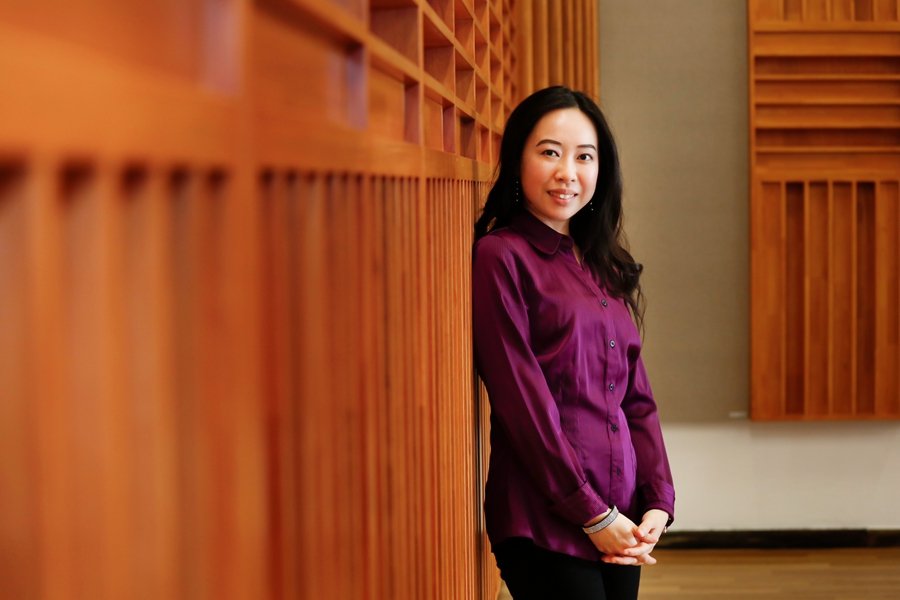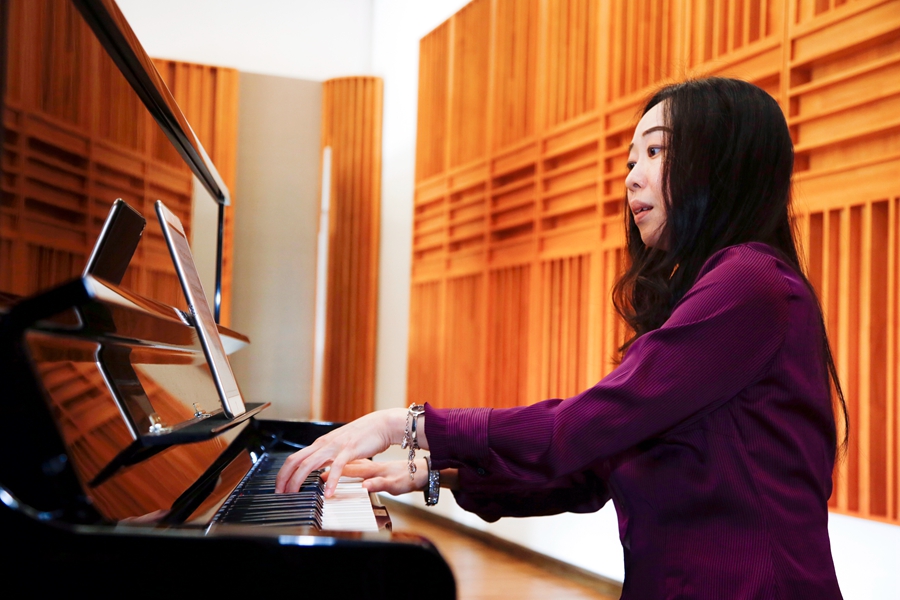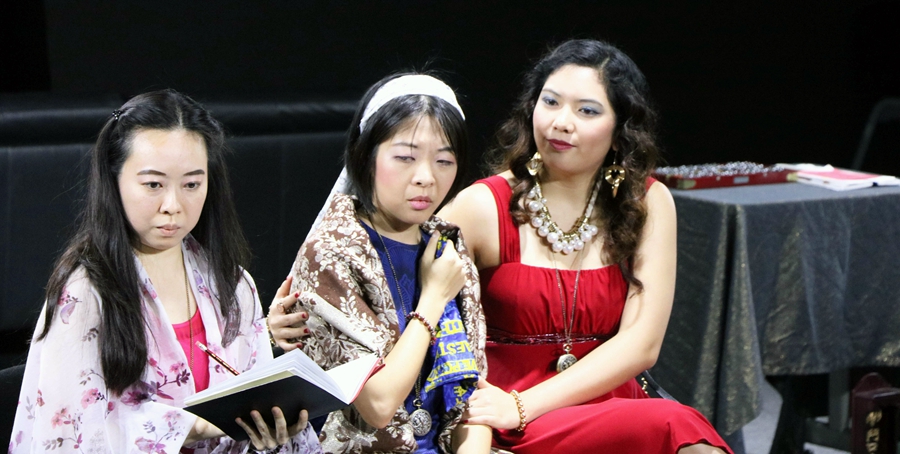Her fingers are agile as they dance across the keys, alighting first on ivory then gliding to ebony. Her creamy, silky voice wafts down the hallways of Shiu Pong College. When she sings, Prof Katrine Wong, director of UM’s Centre for Teaching and Learning Enhancement (CTLE) and associate professor from the Department of English, changes into a different charm from the refined lady I know from her literature class.
Sing like a Fairy
Music defines Katrine, for it opens pathways to boundless explorations. Instead of the latest Katy Perry release, Justin Bieber’s most popular songs or Lady Gaga, Katrine prefers to dive into classical music pieces, most of which were written centuries ago. In the realm of music, myths are immortal, through which she sees each beautiful note telling a story.
When she sings a phrase, Katrine would feel as if she is travelling to a particular moment or place where the scene is set in a masterpiece. For instance, her favourite piece ‘Píseň Rusalky o Měsíčku’ (Song to the Moon), a romantic aria in Rusalka (water spirit from Slavic mythology) – a fairytale opera by Antonín Dvořák – unleashes her imagination so vividly that she’d sing as if she was Rusalka, living in a lake.
‘I’m moved every time I sing this aria; the voice line and the accompaniment work together just so, so beautifully. It gives me goosebumps, in a good way,’ says Katrine. ‘The narrative is highly poetic, and the character, a water spirit, speaks to the moon about her passion for a mortal being [to become human to seek love]. I always get excited when I see the moon – new moon, full moon. I love the moon.’
Feed Her Soul with Music
Despite being busy with routine teaching and research, Katrine won’t allow music to fade away from her life. She has performed for notable Leeds University Liturgical Choir, Harvard Summer Chorus, Hong Kong Chamber Choir and Diocesan Graduate Singers. As a classically trained pianist and soprano, Katrine provides vocal lessons to singers from Shiu Pong College, the University of Macau Choir, and Macau Perosi Choir, every Tuesday evening and Saturday afternoon. She teaches them techniques like posture, placement, resonance and breathing, and inspires them to ‘own’ the song.
‘Conventionally, music and lyrics work together in a piece of vocal music. Very often I take choir members through the overall structure of the piece, then we look at various things such as music present in the words (or syllables, or consonants and vowels for that matter), meanings of the words, the lilt in the line,’ says Katrine. ‘Combining textual interpretation and musical finesse is a fulfilling process. For songs in Cantonese or Mandarin, the task becomes a bit more challenging because of the tonal quality and lexical structure of the Chinese language.’
As to the sacrifice she has to make for music, Katrine says with a smile, ‘it’s a bit heavy to say “sacrifice”, but it’s true that in recent years I have spent most of my Saturday afternoons with Coro Perosi, rather than with my family. Yet I like seeing them. The Choir draws in a lot of interesting people. We are from all walks of life. It’s not just the music but also the people that attracts me to spend my time with.’
Always in a Mood for Melody
Surprisingly, Katrine did not grow up in a family where music was a daily part of her life – her father was an editor at Oriental Daily News (Hong Kong), whom she seldom saw. They communicated via notes he wrote before leaving for his night shifts. Yet she recalls he had a great voice and often sang and whistled, so she learned from him.
The key person who introduced her to the world of singing was the headmistress from her primary school. She still remembers how exciting yet nerve-wracking it was when the headmistress picked her to perform for a celebration in school together. ‘The Holy City’ – a religious Victorian ballad dating from 1892 – was the song selected for the performance. ‘Just imagine! How difficult that piece would be for a ten-year-old girl, who had learnt piano for only four years! There were octaves that I couldn’t even manage,’ she says.
‘I was enchanted by her [the headmistress’s] voice. She was a great soprano singer. She picked me as a pianist to work with her,’ says Katrine. ‘She was like a friend and encouraged me by saying “let’s make some good music. Let’s pause a little bit here and there. Listen to my breathing, listen for when I need to take a breath,” so that was a very professional yet informal training.’
Katrine holds professional titles of FTCL (Solo Piano) and LTCL (Voice Performance) from Trinity College London. When she sings, you would be impressed not only by her powerful vocal dynamics, but also by a wealth of emotions she channels into the notes.
‘Lady Conscience’
Katrine loves theatre, but she seldom shows off her acting talent, at least not when I was her student years ago. Yet, fortunately, I watched her show for the first time in the Script Road – Macau Literary Festival 2017. Her performance was stunning.
Originally, Katrine was the director for her original allegorical play The Three Ladies of Macao. However, two days before the show, something unexpected happened: the student who played Lady Conscience – one of the title roles – pulled out from the production last minute. Either the show had to be canceled, which would disappoint the audience, or somebody had to jump in for the role – eventually Katrine did.
It was tough for Katrine to memorise all the dialogues on such short notice, not to mention facial expressions, movements and gestures. But instead of dwelling on the problem, she tried her best and, surprisingly, played her role in a controlled, dramatic fashion. Perhaps, she is very much a Lady Conscience in real life, always kind, for giving and thankful – a perfect embodiment of her life motto – ‘Never go to bed angry.’



